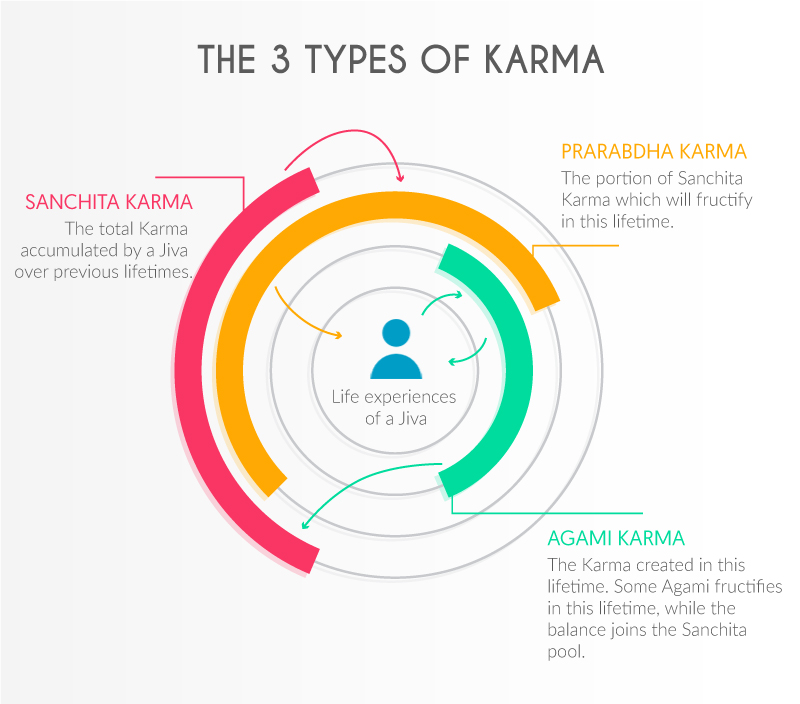Introduction
The Law of Karma is one of the most important laws of Vedic teaching, and is unique to the Vedas. The scriptures say it is even more fundamental and important than Self-Knowledge as understanding this law is important not just for students of Vedanta, but even for worldly people who want to avoid suffering in life.
In this sub-module we’ll discuss:
1. The 2 principles of Law of Karma (LOK).
2. Benefits of assimilating the LOK.
3. The 3 types of Karma.
The 2 Principles of Law of Karma
Principle 1 – Punyam and Papam
In the first module we learnt about Dharma. If the action we do is good, in keeping with the norms of Dharma – in other words a Dharmic action – there is a good visible and invisible result.
If it’s a bad action that breaks the norms of Dharma, i.e. an Adharmic action, then there is a bad visible and invisible result.
For e.g. if I give money to charity, the visible result is that someone benefits from my action. The second result is, since I have done a noble action of helping others, it produces a positive invisible result which will manifest in future as a pleasant experience for me.
This future positive result is called Punyam, and any action which produces Punyam is called Punya Karma (good Karma in modern parlance).
On the other hand if I cheat someone of money, the immediate visible result is increase in my bank balance, but it produces a negative invisible result which is an unpleasant experience for me in future.
This future negative result is called Papam, and any action which produces Papam is called Papa Karma (bad Karma in modern parlance).
Thus, in addition to the visible result, every deliberate action produces Punyam and Papam. One won’t see Punyam and Papam immediately because they are invisible and manifest in future.
So the first principle of Law of Karma is Punyam and Papam.
Principle 2 – Manifestation of Happiness and Sorrow
We can never predict when a particular Punyam will manifest as happiness. Punyam from a good deed done today can manifest as a pleasant experience tomorrow, day after tomorrow, a decade later, or even in the next birth.
Some Punyams can give immediate happiness, while some give delayed happiness.
To explain this, the example given in scripture is of the different types of seeds planted on the same day. A papaya, mango and coconut tree, each will taken different lengths of time to grow to their full height even if their seeds are planted on the same day.
Since the Punyam-Papam can fructify at different periods, some Punyam-Papam may not even fructify in our current lives. So for every Jiva at the end of their lives there is some un-fructified Punyam-Papam.
This un-fructified Punyam-Papam is the reason for reincarnation, and for fruition of its pending Karma the Jiva receives an appropriate body.
And because Karma is carried forward into future lives, a person can never escape the Law of Karma, even if they manage to escape the law of the land after committing a crime.
The LOK necessitates future births, and therefore the cycle of birth and death is caused by LOK.
The scriptures say LOK has to be properly understood and assimilated by every individual because it generates a healthy attitudinal response to our life problems.
Benefits of Assimilating the Law of Karma
1. Explains The Disparities In Everyone’s Life Experiences
Even among human beings some are born rich, and some poor. Some are born hale and hearty, and some with congenital disorder. All these disparities are explained by LOK.
If LOK is not accepted then these disparities have to be explained by the theory of chance. And no logical, intelligent person will accept the theory of chance.
I see the creation as being orderly. Science proves everyday that creation is governed by laws, and where laws exists, there is order.
Then how can we say these disparities alone are caused by chance?
2. Allows Healthy Acceptance Of Sorrows
LOK helps in acceptance. I know I am responsible for my suffering because of my past actions.
I may not remember my past actions, and even if I remember I may not be able to pinpoint which past action is the cause for my current suffering. But I do know that I have done innumerable Papa-Karmas and Punya-Karmas in the past which are the reason for my current state – good or bad.
Hence I will not blame anyone else, I will own up that I am responsible for what happens to me. And with non-resistance and acceptance, the intensity of my suffering reduces.
3. Keeps Our Faith In God
But in reality there is no injustice in the world. There seems to be injustice because we do not recollect our past Papa-Karmas.
By understanding LOK our faith in God will not be shaken.
4. We Can Take Responsibility For Our Future
This means if I can live in the present intelligently, I can influence my future. Even if I cannot totally control my future, I can greatly influence it.
People think LOK leads to fatalism. In fact LOK is the antidote to fatalism because LOK tells me I am responsible for my present situation, and I am also responsible for my future.
If I don’t accept LOK, then my conclusion would be that somebody else is responsible for my present and future. I would give my life over to chance and fatalism.
When I accept LOK, I accept my freewill and freedom to shape my future.
5. Gives Confidence In Living An Ethical Life
Based on this superficial observation my conclusion would be that if I have to prosper, I have to be unethical.
LOK disproves this. The present ethical person is suffering due to past unethical actions, and the current unethical person enjoys because of his past ethical actions.
Therefore irrespective of our current situation, LOK gives us the confidence to follow an ethical life so that our future will be good.
Thus LOK is required for maintaining the moral order of society.
The 3 Types of Karma
1. Sanchita Karma (Accumulated Karma)
2. Prarabdha Karma (Fructifying Karma)
Sanchita will not affect you in this life because it is not ready for fruition, whereas Prarabdha which is ready for fruition, is responsible for your current life.
Prarabdha decides whether you’re born human or animal, male or female, healthy or with some disorder, your parents, your place of birth and your life experiences.
3. Agami Karma (Expected Karma)
Some of this Agami Karma fructifies in your current life itself. Hence your current life experiences are decided not only by Prarabdha, but also by Agami.
At the end of your life, all Prarabdha is exhausted, some Agami is exhausted and some Agami remains. This balance Agami joins the Sanchita Karma pool.
And from Sanchita again, a portion becomes Prarabdha, which decides your next life, where you exhaust your Prarabdha and create some more Agami, which joins the Sanchita after your death.
And this cycle keeps on repeating for an Ajnani (ignorant person).

The 3 Karmas for an Enlightened person
When a person becomes a Jivan Mukta, he stops identifying with the body, and his identity is established firmly as the Self.
The scriptures say such a person – who no more has any sense of doership or enjoyership – does not acquire any Agami Karma, and Self-Knowledge also destroys his Sanchita Karma.
For a Jivan Mukta, only Prarabdha remains. A Jnani (enlightened person) is like a ceiling fan whose electricity is cut off. But because of past momentum, the ceiling fan still revolves.
This past momentum is Prarabdha, and since there is no electricity (no doership or enjoyership), there is no new momentum (Agami).
So since Prarabdha remains, it will continue to give pleasurable and painful experiences. These experiences will only affect the body, because the Jnani being established as the Self is not affected. Therefore the Jnani is immune even to Prarabdha.
And once Prarabdha is exhausted, Sanchita gone, and no new Agami, there is no Karma left. So there is no reason for the Jnani to acquire a new birth. This is called Videha Mukti, liberation after death.
The Jnani as a result of Self-Knowledge enjoys Jivan Mukti and Videha Mukti.
Summary
| 1. | The Law of Karma is one of the most fundamental and important teachings of the Vedas. |
| 2. | The first principle of LOK is that every deliberate action produces an immediate visible result and an invisible future result. |
| 3. | The second principle of LOK is that the invisible result will manifest as a future experience. If the action is good (Punya Karma), the invisible future result is called Punyam which manifests as a pleasant experience in future. And if the action is bad (Papa Karma), the invisible future result is called Papam which manifests as an unpleasant experience in future. |
| 4. | We cannot predict when Punyam and Papam will fructify. This un-fructified Punyam-Papam is the reason for a Jiva’s reincarnation. |
| 5. | There are 3 types of Karma. Sanchita Karma is the total accumulated Karma of all our previous lives. Prarabdha Karma is that portion of Sanchita Karma that is ready for fruition in the present life. Agami Karma is the new Karma that is created in the present life. |
| 6. | An enlightened person (Jnani) has no sense of doership or enjoyership and hence does not create any Agami Karma. And Self-Knowledge destroys his or her Sanchita Karma. So for a Jnani only Prarabdha remains which gets exhausted at the time of death. So a Jnani has no reason to reincarnate. |


